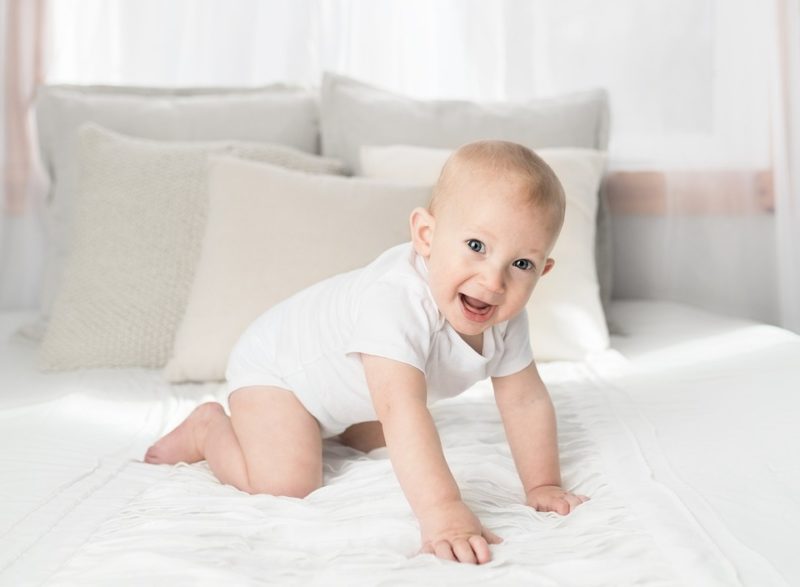If you’re unsure about how to choose baby mattress, please consider four factors. We will also talk about the right mattress type, firmness, and thickness for your baby’s bed. By the end of this article, you should be ready with the ideal and safest mattress for your baby.
We also recommend that you read this guide on how to choose a mattress for a child. Then, you can combine the tips from that article with the ones you’ll learn below.

How Do I Know What Mattress Is Best For My Baby?
Crib size
The baby mattress should be the perfect fit for your crib size. If you already bought a crib, use its dimensions when selecting a bed. On the other hand, use the mattress dimensions when buying a crib if you bought it first.
There are different sizes and shapes of cribs, but it should be easy to select a perfectly fitting mattress. You can test the bed into the crib so that there is no gap on the sides, as seen in this test on how should a crib mattress fit. You can also check this list of the three best crib mattress brands to make shopping easier.
Safety
According to the American Academy of Pediatrics, the baby mattress should be very firm. This is because a soft bed poses a risk of suffocation on the baby. Furthermore, a soft mattress can sag when your baby is lying over it, which means it can change the overall fit of the sheets.
Besides the mattress firmness, remember that babies are more sensitive to materials and chemicals. Check if the baby mattress is hypoallergenic and if it also has an antibacterial feature. Consider natural baby mattresses, ask your pediatrician for a recommended material, or opt for a reputable crib mattress brand that passed multiple standards and tests.
Comfort
Select a baby mattress that won’t retain heat because overheating during sleep can increase the risk of Sudden Infant Death Syndrome. The mattress material should be breathable and uses materials that promote circulation. Furthermore, you don’t want your baby to feel uncomfortable with his sweat when it collects on the mattress.
Remember that babies are easily prone to rashes, so you want a baby mattress that will stay dry. Select a breathable mattress to wick away moisture from your baby. This mattress characteristic will also keep the surface dry even when your baby sweats.
Ease of cleaning
The final consideration when selecting a baby mattress is the ease of cleaning. You don’t want your baby to sleep on a soiled surface for multiple health reasons. Therefore, the bed should have a waterproof side and a removable cover that you can easily clean or wash.
Most crib mattresses in the market have features that make cleaning easier. For example, they have surfaces that you only need to wipe or vacuum for fast cleaning. Just remember to check their materials if they are also safe for your baby.
What Type Of Mattress Is Best For A Baby?
The best type of mattress for your baby will depend on how you weigh the pros and cons of each product. In general, the three most common mattresses for a baby are foam, standard spring, and pocket spring. You must also apply the four factors discussed when choosing among them.
What is better for a baby foam or a spring mattress?
A baby foam mattress is relatively affordable, and the best ones are even durable. However, you want to check the materials and chemicals in this mattress type. On the other hand, the pricier spring baby mattress offers fantastic support and breathability compared to some foam beds.
Is memory foam bad for babies?
Memory foam mattresses are not advisable for babies because of their contouring characteristics. You don’t want your baby to sink on the mattress since it poses suffocation risks. Furthermore, memory foam is one of the hottest materials in beds, so it’s safer to get something breathable with good air circulation for your baby.
Should Babies Sleep On A Firm Or Soft Mattress?
Babies should always sleep on a firm mattress for two reasons. First, a soft bed can sink when your baby lies on it, putting him at risk for suffocation. Additionally, a sinking surface can also change the fit of the sheets that should always be tight and snug because of suffocation hazards.
The second reason the baby mattress must be firm is to support your child’s developing body properly. Remember that a baby’s bones are still soft and growing, so he should lie on a surface that would help keep them supported. Never use a mattress that conforms to your little one’s body.
How Thick Should A Mattress Be For A Baby?
A baby mattress should be around 6 inches thick because getting something thicker also poses a suffocation risk. Furthermore, this thickness is low profile and safe with the rail height. If you need a better size guide, here is an article on how to choose the right crib mattress size.
Conclusion
And that’s it! To recap how to choose baby mattress, you must consider four factors. They are the crib size, mattress safety, comfort, and ease of cleaning.
Ultimately, always get a firm, breathable baby mattress. This will prevent suffocation risks and even SIDS.
